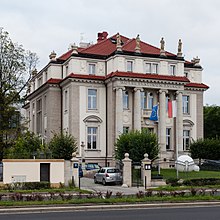Leopold Schoeller (entrepreneur, 1830)
Philipp Eberhard Leopold Schoeller (born January 8, 1830 in Düren , † December 31, 1896 in Silesia ) was a major German entrepreneur in Breslau .
Live and act
The son of the Düren entrepreneur Leopold Schoeller (1792-1884) and Maria Emilia Schöller (1800-1854), daughter of Düsseldorf's Mayor Philipp Schöller, studied at the University of Bonn after completing his schooling and then completed several commercial and technical internships, including his father's Fine cloth factory , in the Schoeller kk fine cloth and wool goods factory in Brno under the management of his cousin Philipp Wilhelm von Schoeller (1797–1877) and in the Schoeller's worsted yarn spinning mill in Breslau with his brother Rudolf Wilhelm Schoeller (1827–1902).
After his father founded the Dürener Teppichkontor, later the Anker carpet factory, in 1854 , Philipp Eberhard Leopold was entrusted with its management, as his father concentrated on the administration of his various companies and the international trade in his goods. The beginnings of the manufacture were shaped for Leopold jr. Difficult for various reasons, as various technical and personnel problems initially prevented the factory from getting out of the red. As a result, his father decided in 1867 to move personnel and administrative staff. His son Rudolf Wilhelm relocated the headquarters of Schoeller's worsted yarn spinning mill from Breslau to Zurich in order to open up new markets there, although the factory in Breslau was retained as a branch. Philipp Eberhard Leopold was to take over the job, while at the same time the management of the carpet office fell to his younger brother and later secret councilor Philipp Nikolaus Schoeller (1833–1904). Later and after Leopold's death, his great-nephew and grandson of Rudolf Wilhelm, Leo Schoeller (1878–1936), took over the worsted yarn factory until it was closed in 1925.
Philipp Eberhard Leopold was also given the management of the agricultural goods and sugar factories in Klettendorf near Breslau, which his father had also acquired and built around 1845 under the name Gebrüder Schoeller & Co and later, after 1922, in the joint venture vom Rath, Schoeller & Skene flowed into it. Leopold Jr. understood it with entrepreneurial foresight and thanks to modern machines to increase the yields and with the resulting financial proceeds to build further sugar factories in Rosenthal and Groß Mochbern near Breslau. Like his German relatives, he also invested in the founding of a cellulose factory and several paper factories, as well as in the acquisition of additional property in several areas of Silesia, such as the Paschkerwitz manor near Breslau from 1872.
Despite the high burden of managing these properties and thanks to his high social standing, Schoeller was appointed or elected to numerous public functions. For many years he headed the Silesian Association for Sugar Beet Manufacturing and was a member of the Breslau Chamber of Commerce, the Wroclaw Chamber of Agriculture, the Wroclaw Agricultural Association and, from 1895, the Wroclaw District Railway Council and finally also the State Railway Council of the Prussian State Railway . As co-founder and chairman of the Silesian Provincial Association for River and Canal Shipping , Schoeller made significant contributions to the creation of the Oder-Spree Canal .
In addition, Leopold Schoeller was involved in politics and joined the Free Conservative Party , which had an important stronghold in Silesia. For this Schoeller was elected from 1889 to 1893 as a representative of the city of Breslau in the Prussian House of Representatives, where he distinguished himself above all as a champion for traffic advances and as an expert in tariff issues. In a period of massive conflicts of interest between industry and agriculture, Schoeller tried to balance and mediate these opposites.
The descendants and relatives of Philipp Eberhard Leopold Schoeller, who had been married to Johanna Emilie Draemann (1835–1863) from Düren since 1856, who were active and resident in Breslau until around 1945, had one after them in the district of Borek (Kleinburg) for many decades named Villa Schoeller , which was later converted into a 5-star hotel. One of his sons, Leopold Schoeller (1862–1907), returned to Düren and founded the Schoeller Textil company here in 1889, which was successful up to the turn of the millennium .
Works (selection)
- Schoeller, Leopold: The resolutions of the permanent tariff commission of November 27, 1879 with regard to Silesia and its agricultural interests ; Breslau, Korn, 1880
Literature and Sources
- Heinrich Wendt: Schöller, Leopold . In: Allgemeine Deutsche Biographie (ADB). Volume 54, Duncker & Humblot, Leipzig 1908, p. 151 f.
- Hugo Schoeller, August Victor Schoeller: History of the Schoeller Family , 2 volumes. R. Eisenschmid, Berlin 1894. New edition by Stedman and Wallmoden 1994, ISBN 3-980-32882-1 .
- Georg Schoeller: Schoeller - engagement in Silesia ; Private print, Berlin, 2004
- 74th Annual Report of the Silesian Society for Patriotic Culture, Nekrologe p. 6 ff. In: Schlesische Zeitung , January 2, 1897
Web links
Individual evidence
- ^ Paschkerwitz ownership entry
- ^ Mann, Bernhard (edit.): Biographical manual for the Prussian House of Representatives. 1867-1918 . Collaboration with Martin Doerry , Cornelia Rauh and Thomas Kühne. Droste Verlag, Düsseldorf 1988, p. 349 (handbooks on the history of parliamentarism and political parties; vol. 3); for the election results see Kühne, Thomas: Handbook of elections to the Prussian House of Representatives 1867–1918. Election results, electoral alliances and election candidates . Droste Verlag, Düsseldorf 1994, pp. 321–323 (handbooks on the history of parliamentarism and political parties; vol. 6)
- ^ Villa Schoeller Breslau-Borek
| personal data | |
|---|---|
| SURNAME | Schoeller, Leopold |
| ALTERNATIVE NAMES | Schoeller, Philipp Eberhard Leopold (full name) |
| BRIEF DESCRIPTION | large German entrepreneur in Wroclaw |
| DATE OF BIRTH | January 8, 1830 |
| PLACE OF BIRTH | Düren |
| DATE OF DEATH | December 31, 1896 |
| Place of death | Silesia |
